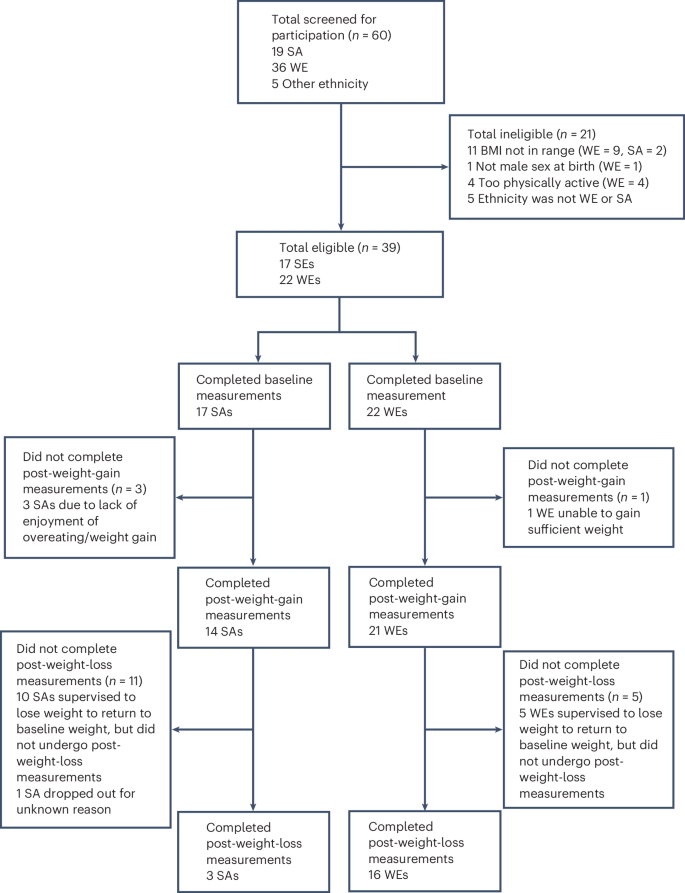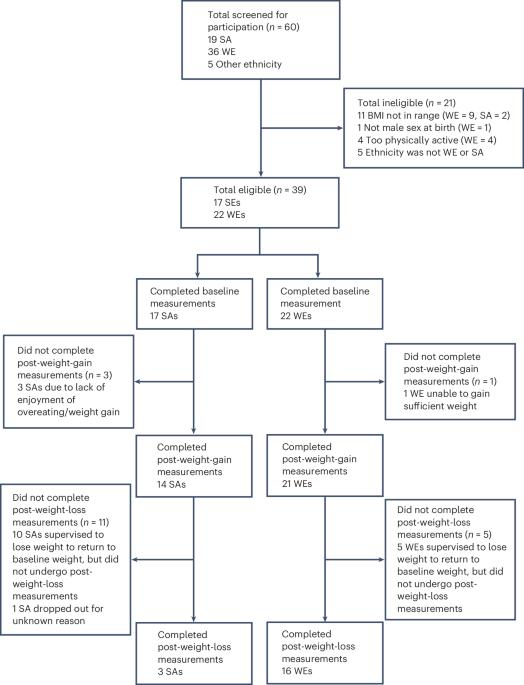Weight gain leads to greater adverse metabolic responses in South Asian compared with white European men: the GlasVEGAS study
IF 18.9
1区 医学
Q1 ENDOCRINOLOGY & METABOLISM
引用次数: 0
Abstract
South Asians (SAs) develop type 2 diabetes at lower body mass index values than white Europeans (WEs). This basic human experimental study aimed to compare the metabolic consequences of weight gain in SA and WE men without overweight or obesity. Fourteen SAs and 21 WEs had assessments of body composition, metabolic responses to mixed-meal ingestion, cardiorespiratory fitness and physical activity, and a subcutaneous abdominal adipose tissue biopsy, before and after 4–6 weeks of overfeeding to induce 5–7% weight gain. Here we show that body mass index and whole-body adipose tissue volume increases similarly between ethnic groups, but SAs gain less lean tissue. SAs experience a substantially greater decrease in insulin sensitivity compared with WEs (38% versus 7% decrease, P = 0.009), have fewer small (37.1% versus 60.0%, P = 0.003) and more large (26.2% versus 9.1%, P = 0.005) adipocytes at baseline and have a smaller decrease in very small adipocytes with weight gain (−0.1% versus −1.9%, P < 0.0001). Ethnic differences in adipocyte morphology are associated with SA’s greater adverse metabolic changes with weight gain. ClinicalTrials.gov registration: NCT02399423 . Modest weight gain leads to greater adverse metabolic consequences in South Asian compared to European men, in part driven by differences in adipocyte morphology.


南亚男性与欧洲白人男性相比,体重增加会导致更严重的不良代谢反应:GlasVEGAS 研究
南亚人患 2 型糖尿病的体重指数值低于欧洲白人。这项基础人体实验研究旨在比较体重增加对没有超重或肥胖症的南亚人和欧洲白人男性的代谢影响。14 名南澳大利亚人和 21 名欧洲白种人在过度喂养 4-6 周以诱导体重增加 5-7% 前后,接受了身体成分、对混合餐摄入的代谢反应、心肺功能和体力活动的评估,并进行了皮下腹部脂肪组织活检。我们在此表明,不同种族群体的体重指数和全身脂肪组织体积的增加情况相似,但南澳大利亚人增加的瘦肉组织较少。南澳大利亚人的胰岛素敏感性比西澳大利亚人下降得多(38% 对 7%,P = 0.009),基线时小脂肪细胞较少(37.1% 对 60.0%,P = 0.003),大脂肪细胞较多(26.2% 对 9.1%,P = 0.005),随着体重增加,极小脂肪细胞减少得较少(-0.1% 对 -1.9% ,P < 0.0001)。脂肪细胞形态的种族差异与南澳大利亚人体重增加时更大的不良代谢变化有关。ClinicalTrials.gov 注册:NCT02399423。
本文章由计算机程序翻译,如有差异,请以英文原文为准。
求助全文
约1分钟内获得全文
求助全文
来源期刊

Nature metabolism
ENDOCRINOLOGY & METABOLISM-
CiteScore
27.50
自引率
2.40%
发文量
170
期刊介绍:
Nature Metabolism is a peer-reviewed scientific journal that covers a broad range of topics in metabolism research. It aims to advance the understanding of metabolic and homeostatic processes at a cellular and physiological level. The journal publishes research from various fields, including fundamental cell biology, basic biomedical and translational research, and integrative physiology. It focuses on how cellular metabolism affects cellular function, the physiology and homeostasis of organs and tissues, and the regulation of organismal energy homeostasis. It also investigates the molecular pathophysiology of metabolic diseases such as diabetes and obesity, as well as their treatment. Nature Metabolism follows the standards of other Nature-branded journals, with a dedicated team of professional editors, rigorous peer-review process, high standards of copy-editing and production, swift publication, and editorial independence. The journal has a high impact factor, has a certain influence in the international area, and is deeply concerned and cited by the majority of scholars.
 求助内容:
求助内容: 应助结果提醒方式:
应助结果提醒方式:


